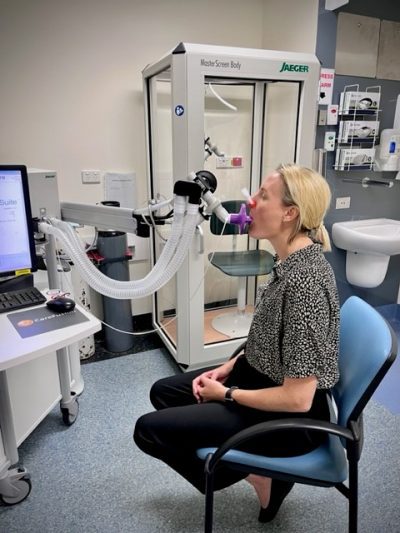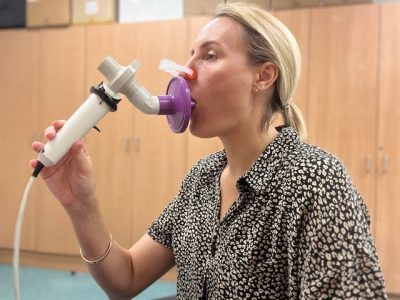Lung Function Tests
What are lung function tests?
Lung function tests (also known as respiratory function or breathing tests) are important investigations that can help your doctor:
- in the diagnosis of lung disease,
- guide and monitor treatment decisions,
- assess suitability for surgery.

Respiratory function testing
What will the tests involve?
There are many different types of breathing tests. The test or combination of tests that you will be doing will depend on what the doctor is investigating. A respiratory scientist will explain and guide you through each of your tests. The time it takes to complete your appointment will vary depending on the type and number of tests your doctor has requested. The average appointment time is 45 minutes.
Preparing for your tests
- Avoid wearing perfume or cologne as some of our patients’ symptoms are triggered by strong smells.
- Withhold from smoking on the day of your test.
- Avoid vigorous exercise for 1 hour prior to your test.
- Please continue to take any medications as prescribed by your doctor.
- Spirometry (pre- and post-bronchodilator) requires some medications to be withheld. Please see below under Spirometry (pre and post bronchodilator) for more information.
Lung function tests
For the tests below you will be asked to wear a soft nose clip and breathe on a mouthpiece. Nose clips and mouthpieces are single use. Each test will be repeated multiple times to ensure the results are accurate.

Respiratory function testing (hand held machine)
Spirometry
Spirometry is a test that measures the maximum amount of air you can breathe in and out. You will be asked to do this test both slowly and quickly.
Spirometry (positional)
After a spirometry test, we will ask you to lie on your back on a bed. You will be asked to repeat the spirometry test but this time only quickly. This test measures the strength of muscles used for breathing.
Spirometry (pre and post bronchodilator)
After a spirometry test, we will give you an inhaler (Ventolin). A 10–15-minute rest is then required to ensure the medication has time to take effect. The spirometry test is repeated to determine if the medication improves your results.
If you regularly use short acting inhalers such as Ventolin, Asmol, Bricanyl or Atrovent, you are requested to withhold from using them on the day of your tests. Please continue to use your other breathing medications. If you find it difficult to manage without your inhaler, please use it and make a note of the time.
Gas Transfer
This test measures the amount of oxygen that passes from your lungs into your blood. During this test we ask you to take a deep breath in of a special air mixture, hold your breath for about6-8 seconds and then breathe out. You may be asked whether a drop of blood from your fingertip can be taken to make the results more accurate.
Lung Volumes
Measuring lung volumes (the total size of your lungs) can add more detail to your results. You will be sitting inside a large glass box like a telephone booth, doing normal breathing. You will then be required to do some occasional gentle panting and some maximal breaths in and out.
Maximal Inspiratory and Expiratory Muscle Pressures (MIP/MEP)
This test measures the strength of the muscles used for breathing. You will be asked to ‘suck in’ and ‘push out’ as hard as you can against a blockage in the mouthpiece.
Fractional exhaled Nitric Oxide (FeNO)
Nitric Oxide (NO) is produced in your lungs. This test measures the amount of NO in your lungs, which can increase because of certain breathing conditions like Asthma. You will be asked to take a deep breath in through a small mouthpiece then breathe out maintaining a steady speed for 10 seconds. For the FeNO test you will not need to wear a nose clip.
Contact us
Respiratory Investigation Unit
Location: Level 1, Main Building
Phone: (07) 3139 4744
Fax: (07) 3139 4730
Email: RIUTPCH
Open: Monday-Friday 8.00am-4.00pm
Need help outside hours?
For non-urgent medical issues call 13 HEALTH (13 43 25 84) or visit your GP.
In an emergency call 000.
